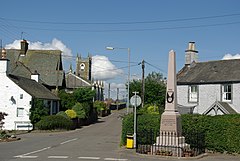Dunscore
| Dunscore | |
|---|---|
 Dunscore village and War Memorial |
|
| Dunscore shown within Dumfries and Galloway | |
| Council area | |
| Country | Scotland |
| Sovereign state | United Kingdom |
| Police | Scottish |
| Fire | Scottish |
| Ambulance | Scottish |
| EU Parliament | Scotland |
| UK Parliament | |
Dunscore is a small village which lies 9 miles (14 km) northwest of Dumfries on the B729, in Dumfriesshire, in the District Council Region of Dumfries and Galloway, southwest Scotland.
The village of about 150 people, has a pub, a post office and a tea room. The village hosts a gala event every August.
It is the birthplace of the Church of Scotland missionary Jane Haining, one of only ten Holocaust victims from Scotland.
Dunscore railway station opened in 1905, closed to passengers in 1943 and to goods in 1949. The station was on the Cairn Valley Railway which ran to Moniaive from Dumfries.
See the Civil Parish Map of Dumfriesshire, for the Civil Parish of Dunscore at : http://maps.nls.uk/atlas/thomson/555.html
Civil Parish Historical Tax Rolls for the Civil Parish of Dunscore, Dumfriesshire, (Volumes 1-5) refer : http://www.scotlandsplaces.gov.uk/digital_volumes/book.php?book_id=555&place_id=10&p_name=Dumfriesshire
Estate is within the Civil Parish of Dunscore.
The name Dunscore is of Cumbric origin, formed of the elements dīn 'fort' and *ïsgor 'fortification, rampart'.William J. Watson proposes the meaning "fort of the bulwark or rampart".
There is a parish church.
The long abandoned Dunscore Old Kirk was located near Fardingwell Farm, between Robert Burns Ellisland Farm and Robert Ferguson's "Isle Tower".
In Thompson's 1832 map Ellisland was spelt "Elliesland" and was next to Isle Tower.
...
Wikipedia

